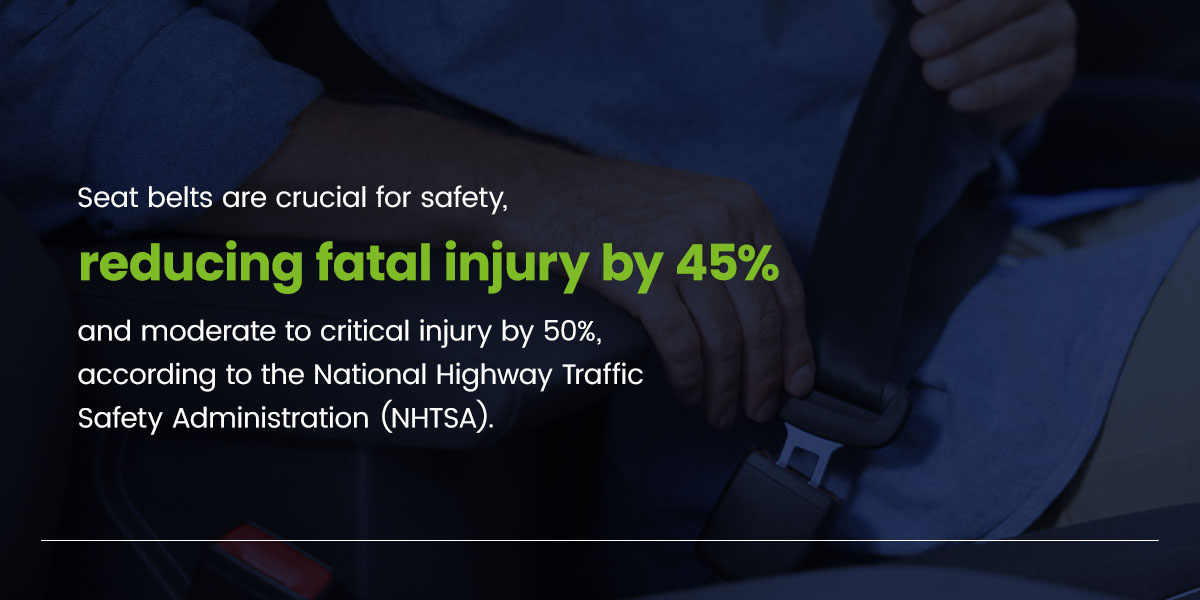“Click it or Ticket” has been a well-known slogan throughout the country for many years now. Wearing a seat belt has become commonplace and something that most people do habitually. When it comes to being safe on the road, choosing to wear your seat belt is one of the most effective things you can do to protect yourself in a crash and defend against impaired, distracted and aggressive drivers.
Seat belts are crucial to vehicle passenger safety, helping prevent serious injuries and fatalities. The importance of wearing a seat belt is supported by an abundance of research and auto manufacturer testing, which has generated significant statistics such as:
At Complete Care, we see hundreds of patients per week who come in after auto accidents. While seat belts can cause superficial injuries, the benefits and importance of seat belts far outweigh the minor bruises or lacerations sustained on a patient’s chest and hips.
Buckling up keeps you safe and secure as a driver or passenger. When a vehicle collides with another vehicle or object, it slows down, but passengers keep moving forward at the same speed as before the crash. Without a seat belt, occupants can be ejected from the vehicle, which is often deadly. Unbuckled passengers could also hit the car’s interior or other passengers. They ensure passengers stay secured to the vehicle, slowing down with it during a collision.

Seat belts are crucial for safety, reducing fatal injury by 45% and moderate to critical injury by 50%, according to the National Highway Traffic Safety Administration (NHTSA). Seat belts are designed to distribute the force of a crash across the body to minimize injuries. They distribute the force along strong, bony body parts, including the shoulders, rib cage and pelvis.
Seat belts also work with safety features such as airbags to minimize injuries and increase safety. Airbags and seat belts are designed to work together — they are not substitutes for each other. Without a seat belt, an occupant could be thrown into rapidly deploying airbags with strong enough forces to cause serious harm and, in some cases, death.
The majority of states in the U.S., with the exception of New Hampshire, have seat belt laws. In Florida, the law requires motor vehicle drivers, front seat occupants and children under the age of 18 riding in the vehicle to wear seat belts.
Florida seat belt laws allow for primary enforcement, where police officers can stop a driver for the sole purpose of not using a seat belt. Many states also use primary enforcement, while others use secondary enforcement, where police can only enforce seat belt laws if they have pulled the driver over for another violation first.
Proper seat belt fit is critical to your safety. The lap belt should be secured across your upper thighs or hip bones. It should not rest across the stomach. The shoulder strap should snugly rest across the center of the chest and rib cage. Keep it away from the neck, but don’t let it fall off the shoulder. The seat belt should not be worn under the arm or behind the back. Wearing the seat belt properly ensures forces are distributed across the body to minimize injuries.
You should always check seat belt fit before buying a new car. If you have an older car, you may need to retrofit it with modern lap and shoulder belts for increased safety. Seat belt adjusters can help you achieve the right fit for your specific needs.
Children should be in a car seat or booster seat until they reach the seat’s height and weight limits. Older children without a booster must be tall enough to sit with their back against the vehicle’s seat, their knees naturally bent over the seat’s edge and their feet flat on the floor. Kids should always ride in the back for safety.
After an accident, it is extremely important to be evaluated immediately. While wearing a seat belt significantly reduces the risk of serious injury and death, other injuries can still occur. At Complete Care, we offer head-to-toe examinations to determine the severity of each injury through diagnostic testing.
Our digital range of motion and functional muscle testing offers a unique way to see how the accident has affected each patient’s mobility and strength. After a thorough review of tests and imaging, our trained physicians can offer a comprehensive treatment plan to help reduce pain, gain muscle strength and improve range of motion.
If you or a loved one has been injured in an auto accident, request an appointment today and speak with one of our New Patient Counselors who will help answer all initial questions and find the most convenient location for you. With several clinics servicing counties across Central Florida, we are wherever you need us.
The information provided on this website does not, and is not intended to, constitute legal advice; instead, all information, content, and materials available on this site are for general informational purposes only. Information on this website may not constitute the most up-to-date legal or other information. This website contains links to other third-party websites. Such links are only for the convenience of the reader, user or browser.